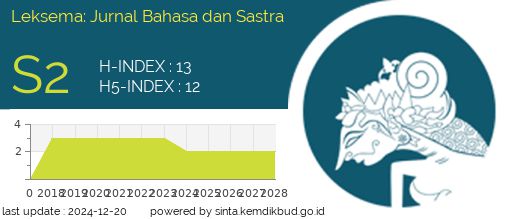AN EPISTMOLOGICAL REVIEW ON HUMANISTIC EDUCATION THEORY
DOI:
https://doi.org/10.22515/ljbs.v1i1.26Keywords:
humanism, education, epistemology, phenomenologyAbstract
Humanism as a paradigm is often declared as an alternative approach to education. This paradigm is, in fact, an approach developed in the field of literature and education. The objective of this study is to determine the values underlie the epistemology of the humanistic education theory. Epistemology is the elements that are abstract or implicit. To recognize the epistemology of humanism education theory, this study examines the elements of basic assumptions, values and models of the theory. The results show that the assumptions promoting the theory have similarities with the basic assumptions of the phenomenological epistemology. It sees humans as creatures with consciousness and knowledge for what he did. Thus, every human’s behavior or action is conducted in purpose. In humanistic education theory, meaningfulness and usefulness of the learning process are determined by the learner, not the educator. For that reason, learning design and methods should be developed by the participants based on the needs of the learners. Therefore, the theory does not provide a model for an individual learning process. Thus, it can be concluded that the theory of humanism education rooted from phenomenology epistemology.
Downloads
References
Abdurrahmansyah. 2010. “Kontribusi kurikulum Humanisme bagi Implementasi Pembelajaran Nilai di Indonesiaâ€. Jurnal At-Tarbawi 9 (2): 131-150
Ahimsa-Putra, H. S. 2009. “Fenomenologi Agama: Pendekatan Fenomenologi untuk Memahami Agamaâ€. Jurnal Penelitian Walisongo 12 (2): 1-33
Ahimsa-Putra, HS. 2011. “Paradigma, Epistemologi, dan Etnografi dalam Antropologiâ€. Makalah dalam ceramah Perkembangan Teori dan Metode Antropologi. Jurusan Antropologi Universitas Airlangga, 6 Mei 2011.
Assegah, A. R. 2003. “Kondisi dan Pemicu Kekerasan dalam Pendidikanâ€. Jurnal Penelitian Direktorat Perguruan Tinggi Agama Islam Istiqro’ 2 (1)
Browaeys, M. 2004. “Complexity of Epistemology: Theory of Knowledge or Philosophy of Science?†Paper presented at Fourth Annual Meeting of ECCON, Driebergen, NL October 22-23,
Cole, VK. B. 2009. “Education for Liberation: the Paulo Freire Methodology.†Paper presented for Alliance for Metropolitan Stability Organizer Roundtable. Rondo Community Outreach Library. April 7
Cortes, JS. 1977. “Education and the Education Communityâ€. Philiphine Law Journal. 52: 329-335
Fortaliza, FC. 2007. “Paulo Freire, in His Views on Educationâ€. Kinaadman An Interdisciplinary Research Journal 18 (2)
Hidayat, W. 2008. “Paradigma Pendidikan Humanistikâ€. Jurnal Pendidikan FAI Universitas Garut
Hiemstra, R dan Ralph G. Brockett. 1994. “From Behaviorism to Humanism: Incorporating Self-direction in Learning Concepts into the Instructional Design Processâ€. In HB. Long & Associates, New Ideas about Self-directed Learning. Norman: Oklahoma Research Center for Continuing Professional and Higher Education - University of Oklahoma.
Lamont, C. 1997. The Philosophy of Humanism. New York: Humanist Press - Half Moon Foundation Inc.
Mudjiyanto, B dan N. Kenda. “Metode Fenomenologi sebagai Salah Satu Metode Komunikatif dalam Komunikologi. Jurnal Penelitian Komunikasi dan Opini Publik ISJD PDII LIPI. jurnal.pdii.lipi.go.id/ admin/jurnal/11105585.pdf
Nyirendra, JE. 1996. “The Relevance of Paulo Freire's Contributions to Education and Development in Present Day Africaâ€. Africa Media Review 10 (1): 1-20
Rachmahana, RS. 2008. “Psikologi Humanistik dan Aplikasinya dalam Pendidikanâ€. Jurnal El Tarbawi 1 (1): 99-114
Rapar, Jan Hendrik. 1996. Pengantar Filsafat. Yogyakarta: Penerbit Kanisius
Rodgers, C. 2002. “Defining Reflection: Another Look at John Dewey and Reflective Thinkingâ€. Teachers College Record 104 (4): 842-866.
Santoso, L. 2003. “Patologi Humanisme (Modern): Dari Krisis Menuju ‘Kepistemologi Rasionalâ€. Jurnal Filsafat, 33 (1): 29-41
Suriasumantri, Jujun S. 2001. Ilmu dalam Perspektif Sebuah Kumpulan Karangan Tentang Hakekat Ilmu. Jakarta: Yayasan Obor.
Tjaya, TH. 2004. Humanisme dan Skolastisisme: Sebuah Debat. Yogyakarta: Penerbit Kanisius
Underhill, A. 1989. “Process in Humanistic Educationâ€. Jurnal ELT 43 (4): 251-2
Downloads
Published
Issue
Section
License
The copyright of the received article shall be assigned to the publisher of the journal. The intended copyright includes the right to publish the article in various forms (including reprints). The journal maintains the publishing rights to published articles.
In line with the license, the authors and users (readers or other researchers) are allowed to share and adapt the material only for non-commercial purposes. In addition, the material must be given appropriate credit, provided with a link to the license, and indicated if changes were made. If authors remix, transform or build upon the material, authors must distribute their contributions under the same license as the original.







